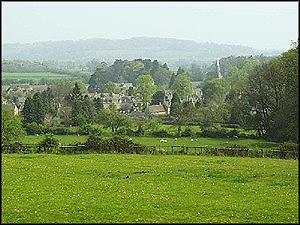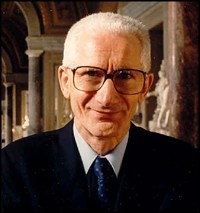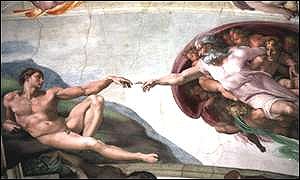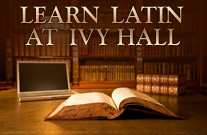
|


PROGRAM:
Series Theme: Wedded to the Creative Imagination from the beginning, Christianity has sometimes found the marriage troubled, and it has been more fruitful at some times than at others. By "creative imagination" is meant the use of images, stories, and literary themes to illustrate and even advance the Christian mind or world view in popular piety as well as high art. This lecture series concentrates on the unparalleled cultural effects that the historic Christian experience has fostered through the use of the creative imagination in art, architecture, music, and literature.
WHEN:
FRIDAY DATES:
WHERE:
Ivy Hall, 6331 Lancaster Ave., Philadelphia 19151 [click here for directions]
COSTS:
$15/person, $25/couple, free for students and religious
|
Tradition, Land, and Conservatism
Date: September 13, 2002
Time: 7:30 PM followed by a reception
Speaker: Dr. John Lukacs, Eminent Historian

|
Dr. Lukacs will address the ways in which Western man once lived in a cultural harmony with nature and the land, forming an often organic unity. He will also analyze the intellectual and historical trends which have served to break down this relationship, causing the destruction of the environment, the alienation of
|
persons from a sense of place, and the loss of beauty in daily life.
Praised by critics as a historian who has the literary talents of a novelist, John Lukacs is the author of more than 20 books, including his most recent book At the End of An Age (Yale 2002). A recipient of the Ingersoll Prize, his other books include The Hitler of History (1997), The Great Powers and Eastern Europe (1954), A History of the Cold War (1961), Outgrowing Democracy: A Historical Interpretation of the U.S. in the 20th Century (1984), and The Duel (Hitler vs. Churchill May 10 to August 31 1940) (1991).
Lukacs served from 1947 to 1994 as professor of history at Chestnut Hill College. He also served as a visiting professor at many universities, including Columbia, Princeton, Johns Hopkins University, and at the University of Budapest in his native Hungary.
Historian John Lukacs talks about the end of the modern, or European, age which emerged roughly five-hundred years ago. Professor Lukacs points to the decline in the importance of many of the major tenets of the modern age - the state, money, production, cities, books, education, privacy, family - as evidence of the shift towards something new. It's a topic he covers in his new book, At the End of An Age, which in whole is a reflection on the nature of historical and scientific knowledge and a summation of Lukac's lifetime of thought on history. Professor Lukacs spoke at Politics and Prose in Washington, DC. He answered questions following his remarks.
Watch an interview with John Lukacs on At the End of An Age on Book TV
|
Michelangelo Rediscovered: The Cleaning of Michelangelo's Frescoes in the Sistine Chapel
Date: October 11th
Time: 7:30 PM followed by a reception
Speaker: Dr. Walter Persegati, Retired Secretary/Treasurer of Vatican Monuments, Museums, and Art Galleries
Topic: MICHELANGELO REDISCOVERED: The Cleaning of Michelangelo's Frescoes in the Sistine Chapel
|
 |
Dr. Walter Persegati was born in Verona, Italy, the town so dear to Shakespeare. For this reason he often likes to be introduced as one of The Two Gentlemen of Verona.
Because of his involvement in reorganizing the Vatican Museums and in the Sistine Chapel project, it is hard to believe that his background is not art but business administration. He is a person of many interests who has always shown organizational skills. For
|
instance, he was responsible for organizing and bringing to the United States the exhibition The Vatican Collections: Papacy and Art which came to New York, Chicago and San Francisco.
He has been the co-founder of the International Federation of Catholic Youth Organizations; he was active in the resettlement of European Refugees in Chicago from 1955 to 1958 and was involved in migration activities, social assistance and public relations for church oriented concerns.
As Assistant Permanent Observer of the Holy See to the Food and Agriculture Organization of the United Nations (F.A.O.) he had a chance to broaden his interests in the international field, particularly in the fight against hunger in the world.
He was active in the Pontifical Council for Justice and Peace.
He helped securing and managing the financing of a large social-religious survey in Latin America that resulted in the publishing of 14 volumes.
For 19 years (from 1971 to 1990) he covered the demanding role of Secretary General and Treasurer of the Vatican Monuments, Museums and Art Galleries, and for 9 of those years he was involved in the Sistine Chapel project (the cleaning of Michelangelo's frescoes). He was faced with the challenge of helping three million visitors a year in making a selective, intelligent and as comfortable a visit as possible to the Museums.
For his life achievements he received a Doctorate in Law honoris causa from the Trinity College, Hartford, CT, and for his involvement in fostering the cooperative movement, Dr. Persegati also received an honorary doctorate degree at the Francis Xavier University, Antigonish, Nova Scotia.
|
Synopsis of Lecture:
The fourteen year cleaning project of Michelangelo's frescoes in the Sistine Chapel has been hailed as the conservation accomplishment of the century. he painstaking, delicate work by the Vatican Conservation Laboratory had started in 1980 with the cleaning of the Ceiling and was completed in
|
 |
1994 with the unveiling of the Last Judgment. he Last Judgment's 400 figures have returned to life after lying for centuries under a blanket of soot. They have emerged from deep darkness. Color has returned to tunics and veils giving the huge fresco unsuspected flashes of light. rime, dirt, lampblack and glues were hiding Michelangelo's frescoes for centuries. A myth about the artist's unfamiliarity with colors or/and his voluntary veiling his frescoes in darkness was thus born. hile as a sculptor he had reached us in all his original power, as a painter he was betrayed by the grime of centuries and by the good intentioned restorers of the past. The cleaning has given Michelangelo, the colorist, justice at last.
Dr. Walter Persegati will illustrate the cleaning process and the stunning results with exclusive slides many of which were taken by the restorers themselves directly on the scaffolding during the actual cleaning activities.
His presentation will cover the following points and others:
- What prompted the Vatican Museums to start the cleaning?
- Research done before any decision was made
- What the grime was made of
- Michelangelo's technique
- How Michelangelo's a secco corrections detected during cleaning and protected?
- Was there a danger that the present cleaning would damage Michelangelo's fresco?
- How was the cleaning done?
- The discoveries of the cleaning
- Michelangelo's different artistic personality from the Ceiling and the Last Judgment
- Why are the colors so brilliant? Was anything done to brighten them up?
- Is it true that Michelangelo himself frescoed some of the veils covering the private parts of many naked figures?
- What was done with the loin clothes painted by restorers in the past?
- Why was the cleaning technique on the Last Judgment so different from the Ceiling?
- If the cleaning was done entirely by the Vatican Conservation Laboratory what was the Japanese involvement in the project?
The slides will tell the story of how things were done and will show unique cross-sections of tiny color specks of fresco and breathtaking examples of before/after. The spiritual and religious significance of the Sistine Chapel frescoes, and of the Last Judgment in particular, will be emphasized throughout the entire lecture.
|
Christianity and the Creative Imagination
Date: November 15th
Time: 7:30 PM followed by a reception
Speaker: Dr. Deal W. Hudson, editor & publisher of Crisis
Topic: "Christianity and the Creative Imagination"
|
|
Dr. Hudson will address the debate between those who espouse propositional truths-- theologians and philosophers -- and the artists whose work often elicits life-changing passions. In what sense can a person be converted by beauty to a life that genuinely embraces propositional truth? Isn't it the case that apologists for beauty often want to downplay propositional truth for a morally or spiritually admirable life? Isn't it the case that the fear of beauty and criticism of the artist stems from a fear of disordering passion? He will also consider the phenomenon of conversion, coming from his personal experience converting to Catholicism, that often emerges within the tension between propositional truth and aesthetic experience.
 |
Deal W. Hudson is publisher and editor of CRISIS Magazine, a Catholic monthly published in Washington, DC. His articles and comments have been published in The Wall Street Journal, New York Times, Washington Post, Washington Times, Los Angeles Times, National Review, Richmond Times-Dispatch, The Village Voice, Roll Call, National Journal, The Economist, and by the Associated Press.
|
During 1999 and 2000 Hudson worked with Karl Rove in coordinating then Gov. Bush's outreach to Catholic voters. In December 2000, Rove asked Hudson to put together a Catholic Working Group to advise the White House on issues important to Catholics. Hudson leads a weekly call to the White House of prominent Catholics who advise the administration on issues of mutual importance.
Hudson appears regularly on television shows such as NBC Nightly News, One-on One with John McLaughlin, C-Span's Washington Journal, News Talk, NET's Capitol Watch, The Beltway Boys, The Religion and Ethics Newsweekly on PBS, and radio programs such as "All Things Considered" on National Public Radio.
|
Hudson has published many reviews and articles as well as four books: Understanding Maritain: Philosopher and Friend (Mercer, 1988); The Future of Thomism (Notre Dame, 1992); Sigrid Undset On Saints and Sinners (Ignatius, 1994); and Happiness and the Limits of Satisfaction (Rowman & Littlefield, 1996).
|
|
|
|
|








